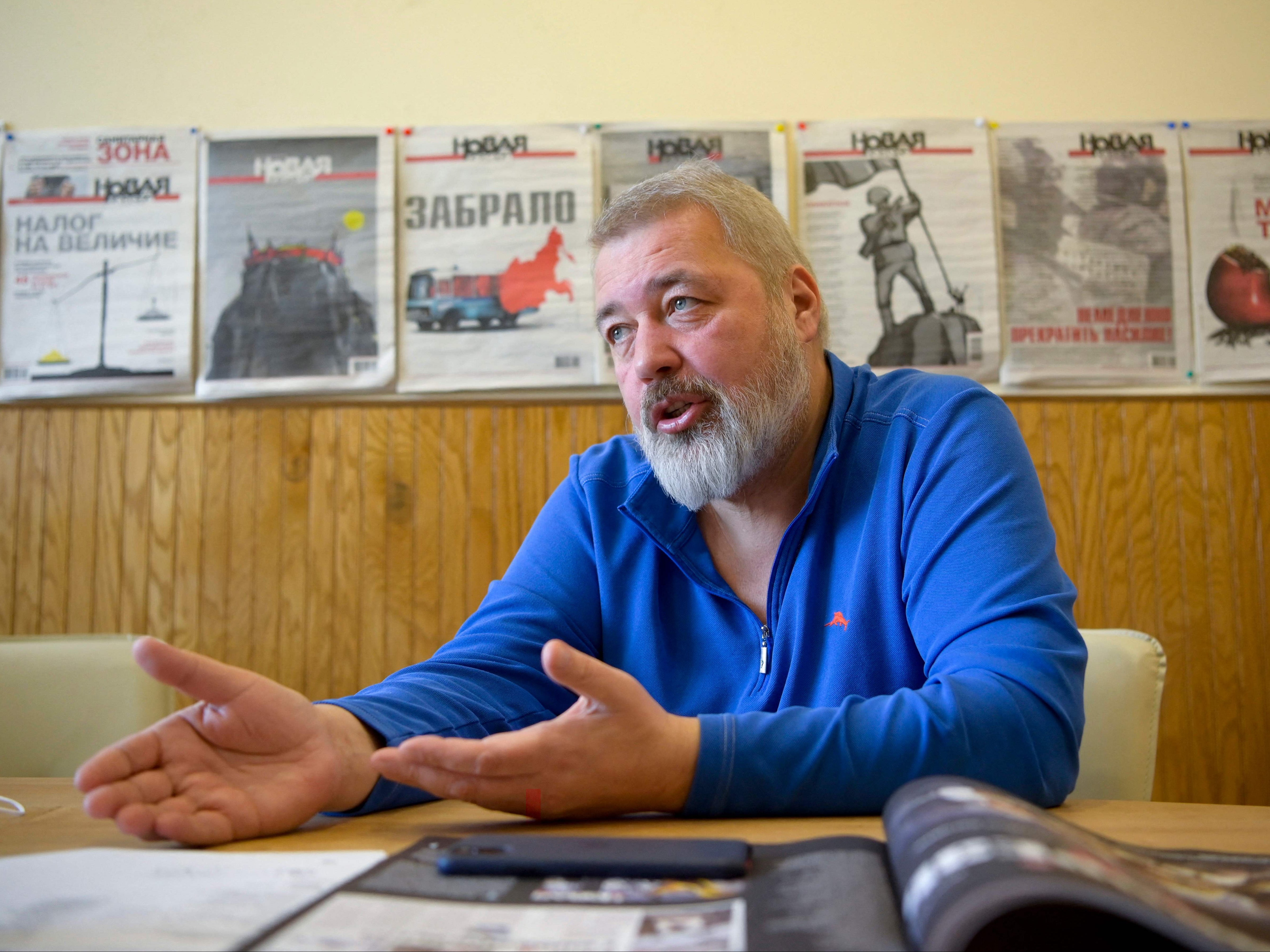Nobel Peace Prize-winning editor defends Lebedev family from criticism
Dmitry Muratov said security concerns about the family are ‘misguided and dangerous’

Your support helps us to tell the story
From reproductive rights to climate change to Big Tech, The Independent is on the ground when the story is developing. Whether it's investigating the financials of Elon Musk's pro-Trump PAC or producing our latest documentary, 'The A Word', which shines a light on the American women fighting for reproductive rights, we know how important it is to parse out the facts from the messaging.
At such a critical moment in US history, we need reporters on the ground. Your donation allows us to keep sending journalists to speak to both sides of the story.
The Independent is trusted by Americans across the entire political spectrum. And unlike many other quality news outlets, we choose not to lock Americans out of our reporting and analysis with paywalls. We believe quality journalism should be available to everyone, paid for by those who can afford it.
Your support makes all the difference.The Nobel Peace Prize-winning editor of a liberal Russian newspaper known for its critical treatment of Vladimir Putin’s government has criticised the “unfair and inaccurate” coverage of the Lebedev family in the UK.
Dmitry Muratov – who has been praised for his work championing press freedom at the Novaya Gazeta newspaper – said accusations levelled against the family were “misjudged” and “dangerous”.
Labour has raised questions about Boris Johnson’s relationship with Evgeny Lebedev – a shareholder of The Independent – and Lord Lebedev’s elevation to the Lords, following claims that the head of MI6 had raised security concerns over the appointment.
Mr Muratov said the family had championed press freedom and democracy in Russia, pointing to the role Lord Lebedev’s father Alexander played in saving Novaya Gazeta from collapse.
“The Lebedevs have supported the universal ideals of independent journalism, competitive politics and transparent corporate governance everywhere, including in Russia,” he wrote in The Times.
He added: “If the people of Britain truly care about a free and independent press, about democracy and freedom of speech, then they should not hunt down those who have fought brave battles to uphold these values. The Lebedevs are not your enemy.”
The Nobel laureate said Alexander Lebedev’s financial support for his newspaper had been vital in keeping Novaya Gazeta running after the murder of journalist Anna Politkovskaya, who was assassinated in 2006.
“The paper was at risk of folding and, entirely disheartened, I considered letting it close. It was only after the intervention of Alexander, a great friend of Anna, and [former Soviet president Mikhail] Gorbachev, that we decided to continue,” he wrote.
“Between 2000 and 2021, six of our journalists were killed. One must only look at their tragic fates to understand the risk for anyone who associates themselves with the newspaper.”
Mr Muratov also said that when he was a shareholder of Aeroflot, Alexander Lebedev placed Alexei Navalny, an outspoken critic of Mr Putin, on the board of the company.
The editor was the co-recipient of the Nobel Peace Prize last year, alongside Filipino journalist Maria Ressa, for their efforts to defend freedom of expression in the face of authoritarian governments. He was part of the founding team of Novaya Gazeta in 1993, and became its editor in 1995.
Mr Muratov has been heavily critical of Russia’s invasion of Ukraine, and printed his paper in both Russian and Ukrainian following the start of the war.
Lord Lebedev acknowledged last week that his father was “a long time ago” a KGB officer, but has denied being a security risk to this country.
He stated: “I may have a Russian name, but that makes me no less a committed or proud British citizen than anyone else in this country of ours.
“Being Russian does not automatically make one an enemy of the state, and it is crucial we do not descend into Russophobia, like any other phobia, bigotry or discrimination.”
Sir Keir Starmer has said there are questions for Mr Johnson to answer over his relationship with Lord Lebedev, and has written to the House of Lords Appointments Commission over the decision to grant Lord Lebedev a peerage.
Earlier last week, Mr Johnson denied intervening to override security concerns about the peerage granted to Lord Lebedev, telling reporters: “That is simply incorrect ... It suits Putin’s agenda to try to characterise this as a struggle between the west and Russia.”